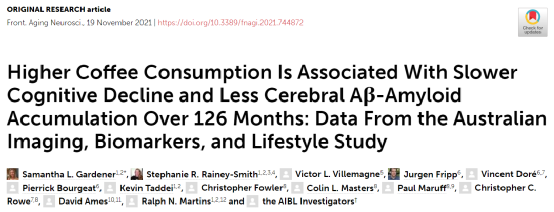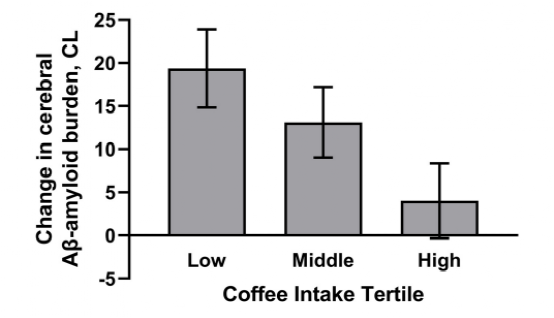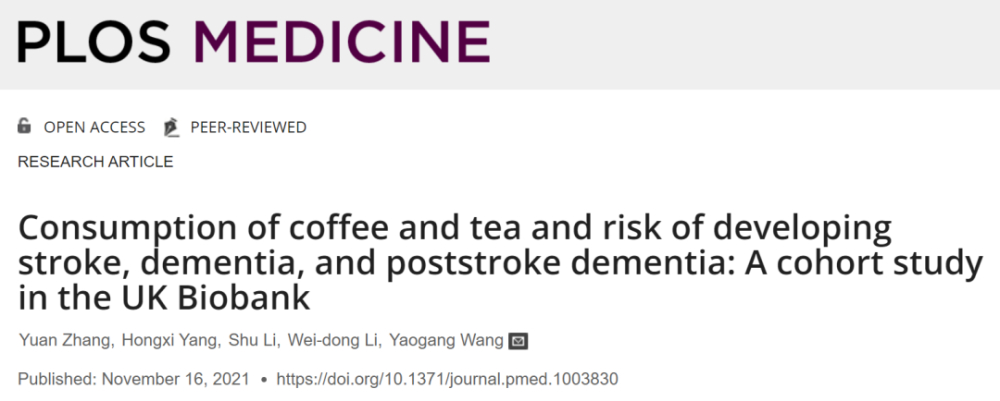Experts against experts say? Does Coffee Prevent or Increase Dementia Risk?
The trade volume of coffee is the second largest commodity in the world after crude oil, which shows the great demand for coffee. Oriental, as the birthplace of tea, in recent years, its coffee consumption has shown a trend of rapid increase. Coffee has become an important drink for more brick bearers, and there is more and more scientific research on coffee and health.
Interestingly, on the one hand, studies have shown that drinking coffee can reduce the risk of dementia; on the other hand, studies have shown that drinking coffee can increase the risk of dementia. These conflicting scientific studies make people wonder whether drinking coffee is good or not.

It is estimated that coffee, as one of the most popular drinks in the world, consumes about 3 billion cups of coffee a day.
When it comes to dementia, it generally refers to Alzheimer's disease, which is characterized by the deposition of β-amyloid and Tau amyloid in the brain, which is the most common neurodegenerative disease.
In November 2021, researchers at Edith Cowen University in Australia published a research paper entitled: Higher Coffee Consumption Is Associated With Slower Cognitive Decline and Less Cerebral A β-Amyloid Accumulation Over 126 Months: Data From the Australian Imaging, Biomarkers, and Lifestyle Study in the journal Frontiers in Aging Neuroscience.

The more than 10-year study shows that drinking more coffee may reduce the risk of developing Alzheimer's disease. Specifically, increasing coffee intake may slow the accumulation of beta-amyloid in the brain.
Dr Samantha Gardener, lead author of the study, pointed out that the findings showed a link between coffee intake and several important biomarkers associated with Alzheimer's disease. People with high coffee intake have lower accumulation of beta-amyloid in the brain.

Also in November of that year, Wang Yaogang's team from Tianjin Medical University published a research paper on PLOS Medicine, which showed that drinking coffee or tea can reduce the risk of stroke and dementia.

The researchers found that drinking two to three cups of coffee or three to five cups of tea a day, or four to six cups of coffee and tea, had the lowest risk of stroke or dementia.
The researchers believe that there are interactions between coffee and tea associated with stroke and dementia, and there are several mechanisms. One of them is that coffee is the main source of caffeine and contains polyphenols and other bioactive compounds with potential health benefits. These substances are considered to have neuroprotective effects, including inhibition of β-amyloid accumulation.
Coffee can have both positive and negative effects on the brain. In August 2021, coffee drinking attracted a lot of attention because, contrary to usual positive studies, coffee drinking was associated with brain capacity reduction. "drinking too much coffee reduces brain capacity" went viral on Weibo, which has been reported by the coffee workshop.
Researchers at the University of South Australia published a research paper entitled High coffee consumption, brain volume and risk of dementia and stroke in the journal nutritional Neuroscience (Nutritional Neuroscience).

The researchers found that people who drank more than six cups of coffee a day had a relatively small brain capacity and a 53% increased risk of dementia compared with those who drank only two cups of coffee a day.
Many studies have shown that coffee intake has a positive effect on the risk of dementia, and if you pay close attention to the coffee intake in these studies, you will find that there are a certain amount of coffee cups. Studies have shown that drinking three to five cups of coffee a day is associated with a 65% reduction in the risk of developing dementia in old age.

Caffeine intake is not so much a cup as caffeine intake. In many studies on the health benefits of coffee, caffeine intake generally does not exceed the 400mg recommended by FDA.
So how many cups of coffee do you drink a day in front of the screen?
Photo Source: Internet
Professional coffee knowledge exchange more coffee bean information please follow the coffee workshop (Wechat official account cafe_style)
For more boutique coffee beans, please add private Qianjie coffee on Wechat. WeChat account: qjcoffeex
Important Notice :
前街咖啡 FrontStreet Coffee has moved to new addredd:
FrontStreet Coffee Address: 315,Donghua East Road,GuangZhou
Tel:020 38364473
- Prev

Chinese women make a fuss at Starbucks! Global Times: more white than a white man
According to a number of foreign media reports, a recent attack on a Starbucks store in MountainView, California, injured people. According to local police, on the afternoon of May 28, a 33-year-old woman, DaixinNeill-Quan (Quan Dai Xin), was at a Starbucks.
- Next

"did you know that baristas are valuable? After all, textual research is so expensive! " Is the barista certificate really useful?
Recently, the backstage can receive a lot of questions about the barista certificate every day. As the boutique coffee culture has gradually spread to everyone's life, being a barista and opening a coffee shop has become an ideal career / ideal life for many friends. But in an era when everyone can make coffee, how to make your own coffee / open coffee
Related
- Unexpected! Ruixing Telunsu lattes use a smoothie machine to foam milk?!
- % Arabia's first store in Henan opens into the village?! Netizen: Thought it was P's
- Does an authentic standard mocha coffee recipe use chocolate sauce or powder? Mocha Latte/Dirty Coffee/Salty Mocha Coffee Recipe Share!
- What is the difference between Vietnam egg coffee and Norway egg coffee? Hand-brewed single product coffee filter paper filter cloth filter flat solution!
- What is the difference between sun-cured and honey-treated coffee? What are the differences in the flavor characteristics of sun-honey coffee?
- How to make Italian latte! How much milk does a standard latte use/what should the ratio of coffee to milk be?
- How to make butter American/butter latte/butter Dirty coffee? Is hand-brewed coffee good with butter?
- Is Dirty the cold version of Australian White? What is the difference between dirty coffee/decent coffee and Australian white espresso?
- Relationship between brewing time and coffee extraction parameters How to make the brewing time fall to 2 minutes?
- Got entangled?! Lucky opens a new store, Mixue Ice City, and pursues it as a neighbor!

